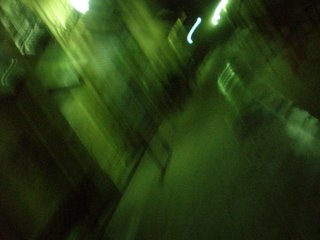 6.00 am: Diana Krall sings through my headphones as the new metro line takes me back home from the airport. It's a strange time of the day, a time I am usually asleep, or just gone to bed, but in any case not on a train on my way home. As the train goes through the stations a complete universe is unravelling before my eyes, the dark side of Barcelona, the side I had not thought about until today, although the silent consequences of its activity have always been there.
6.00 am: Diana Krall sings through my headphones as the new metro line takes me back home from the airport. It's a strange time of the day, a time I am usually asleep, or just gone to bed, but in any case not on a train on my way home. As the train goes through the stations a complete universe is unravelling before my eyes, the dark side of Barcelona, the side I had not thought about until today, although the silent consequences of its activity have always been there.El Prat de Llobregat. A couple of dizzy, yawning latin-american immigrants get on. Changing shifts for the railway workers, the train slides past them, their day has started already but the darkest hour is just before dawn.
Belvitge. Three young nurses from the nearby hospital, climb up the wagon. Their shift has just ended, they are on their way back home, to sleep or perhaps take care of their youngs. They look exhausted but satisfied, maybe no losses at the clinic. Carrying on is what matters. Tomorrow is another night.
Estacio Sants, the commuting branchpoint. Most get off here. Off for a Thursday morning. Unlike a poet once said everyday is not like Sunday.
Passeig de Gracia. Gaudi's attractions are still sleeping, even the earliest of their morning visitors are still dreaming. People working at the hotels in the area, get off here. They strech their suites, tighten their ties, take a last look against the window glass. Perfect hairdo, awfull mood. They rehearse their morning smiles while it is still dawn and practise their "good days" while they dream of their "good nights". Their own time does not coincide with the sun's orbit around the rest of us.
Estacio Franca. Last stop. I get off, pass by the immigrants already lining up outside the immigration office next to the customs. Modern cities can't really distinguish people from commodities. The sky is now powder blue, dark spots mixed with the desperate attempts of dawnlight.
I stop and take a look at the train routes. A line connecting my place with the airport, where I just let someone go. Another one goes all the way to Paris. Soon I 'll be thinking about someone else there. The first sunrays, has just reached Barcelona at a rather obtuse angle. They are scattered into purple. I lift my head up looking for her plane. She must be up there now. I am still at my departure bay. A point on the map of the metro, of a city which is another point in a larger map. As time goes by, we scatter arround, we become points in a graph, no computer scientist will bother to study.
And our lives evolve by joining the dots.

